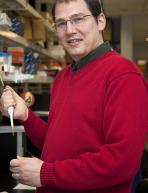


Consortium for Inter-disciplinary Environmental Research
PhD, Universidad Autonoma, Madrid (Spain)
Postdoctoral, National Institute of Environmental Health Sciences. Laboratory of Molecular Genetics and Laboratory of Structural Biology
Mitochondrial gene expression and mitochondrial disease
Mitochondria contain a small (16.5 kb) double-stranded circular genome that in mammals encodes 13 polypeptides. Expression of this genome depends on a molecular genetic system that is distinct from the nuclear gene expression machinery. Defects in mitochondrial gene expression, often resulting from the inheritance of genetic mutations, result in mitochondrial dysfunction and different human diseases. Our work is trying to understand several essential processes for gene expression in mitochondria, and how deficiencies in these processes are related to pathogenesis.
Mechanisms of mitochondrial transcription
Mitochondrial transcription is a carefully regulated process that is crucial to generate the tRNAs, rRNAs and mRNAs necessary for mitochondrial protein production, but is also essential to initiate replication of the mitochondrial genome. How this process is specifically organized and regulated is still a matter of debate, but it involves the RNA polymerase, at least two transcription factors and no more than two or three promoters that generate polycistronic transcripts that are subsequently processed. Understanding the mechanisms by which the cell controls differential initiation at these promoters is key to understand how the transcription process is regulated. We are studying the process of transcription initiation taking advantage of a robust reconstituted in vitro system and a combination of single-particle electron microscopy, small-angle x-ray scattering and biochemical and biophysical measurements.
Transcription termination and MTERF proteins
Another aspect of mitochondrial transcription that we are investigating is the mechanism of transcription termination at a specific site downstream of the rRNA genes. This termination event is dependent on a protein called MTERF1, for Mitochondrial TERmination Factor 1, and it was postulated to be important to determine the ratio of mitochondrial rRNAs to mRNAs, although this is still a subject of debate. We have demonstrated that MTERF1 belongs to a class of modular proteins characterized by an all-alpha-helical fold. We also found that MTERF1 utilizes an extremely unusual DNA binding mechanism that involves active distortion of the DNA molecule and demonstrated that several disease-associated mitochondrial DNA mutations can interfere with this binding mode, severely impairing the termination process. This suggests that their effect on MTERF1 function might be related to the pathogenic mechanism.
Mitochondrial rRNA modifications
We are studying the process of rRNA modification in mitochondria. Although the functional significance of these modifications is unclear, they are essential for mitochondrial function. We have studied the roles in this process of MTERF4, an MTERF family member, and TFB1M, a methyltransferase responsible for adenine dimethylation in a conserved stem-loop near the 3’-end of the 12S rRNA.
DNA synthesis and DNA repair
The nuclear replication process in humans is extremely complex and only partially understood. The accuracy of this process is essential to avoid deleterious mutagenesis. The proteins mainly responsible for this accuracy are DNA polymerases, the enzymes responsible for DNA synthesis. There are at least 15 different DNA polymerases in human cells, and except for a few their functions are largely unknown. Structural analysis of DNA polymerases has made a significant contribution to our understanding of DNA polymerase fidelity and substrate specificity, and this information is precious to understand their biological function.
We are particularly interested in DNA polymerases responsible for smaller patches of DNA synthesis that mainly take place during DNA repair. We are studying how these enzymes contribute to genome stability, in particular in response to DNA damage, and how their function can be affected by different environmental exposures.
For a complete list of current publications please click HERE.
Basic Sciences Tower 7-122
Stony Brook, NY 11794-8651
Tel: 631-444-3054